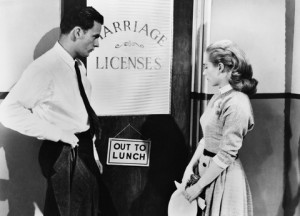 The Lady Who Thought She Liked Football
The Lady Who Thought She Liked Football
Relationship Dependence, “I’m Okay if You’re Okay with Me”
What is Fusion? When does fusion become relationship dependency?
This article is a follow up to discussion of Jodi Picoult’s book The Pact.
Fusion is the process in which one person’s feelings are intertwined with another’s such that his or her life functioning and experience of life is dependent on that person’s emotional state. Fusion or relationship dependency is not a bad thing. Fusion is a natural and necessary process for us as humans are relational beings. Every relationship creates a relationship dependency of sorts.
The level of fusion is determined by the level of chronic anxiety and the level of differentiation of the individuals involved. More on fusion. More on differentiation. More on chronic anxiety.
It’s when typical fusion (desire to please a loved one, protection of a child) unhooks from its moorings and takes over that we move into an unhealthy inter-dependence. Too much fusion or relationship dependence describes the process of being ‘close’ to another person in a way that your feelings are dependent on how the other person feels—particularly how he or she feels about you. We all care about the feelings of those we love. We care that they feel positive towards us. A world without feelings would be a barren robotic existence.
So what does ‘relationship dependence’ look like?
The mother who can’t resist running interference for her child. The girl who checks her phone every five minutes for a message from her boyfriend. The person who avoids contact with his or her family. (‘Cut off’ is usually rationalized as a strength but avoidance is as anxiety-driven as ultra-compliance behavior.) The woman who falls in ‘love’ with an unsuitable partner while he is the physician attending her dying parent. The man who can’t resist acting out his jealousy even knowing he’s destroying the relationship he’s anxious to maintain.
A world totally at the mercy of our feelings is also a barren, though desperate, existence. Such was true with–
 The Lady Who Thought She Liked Football
The Lady Who Thought She Liked Football
I was in my office. (All clinical situations are, of course, disguised to oblivion.) Mrs. A, an attractive late-thirties woman, sat across from me in tears. She’d recently moved from Boston to Austin after her husband of over twenty years had left her for another woman. I started the session.
BD: “I know a whole series of relationships and events play a part in problems, but as a place to start, what is behind your decision to come in today?”
Mrs. A: “Football.”
BD: “Football?”
Mrs. A: “Yes. You see, I’ve always loved football. I was a cheerleader in high school and loved the games. Since I’ve been an adult I’ve especially loved New England Patriots football.”
BD: “Sounds good. Enjoying a game you love can do all sorts good things for your brain chemicals.”
Mrs. A looked up a bit horrified—I’m guessing at my naiveté. She took a sideways glance at the licenses on my wall.
Mrs. A: “Dr. DeShong, football is behind my decision to be here today, but football has nothing to do with it, really. I called for the appointment after what happened last Sunday afternoon. That was when I realized I had no idea who I am. None.”
BD: “Okay . . .”
Mrs. A: “Sunday afternoon I did what I always do . . . because I love football. I piled up pillows on the couch, popped some popcorn with actual butter, and fixed a Dr. Pepper. Just like I always do to enjoy the Patriot game. Just the way I always do. The game kicked off. Ten minutes into play I realized something. I don’t like football. I had zero interest in how football was played and less in watching it played. And I’m not that crazy about popcorn.”
She paused. I did my psychotherapist, “Okay . . . and?”
“Here’s the thing. I thought I loved football. I believed I loved the Patriots. Every week for all those years, I’d gleefully fixed the popcorn, puffed the pillows, and hopped up on the couch raving about my excitement and the players I was so interested in watching. Monday at work I’d go on and on about enjoying the game with my husband like some kind of show. Everyone saw me as a big fan. What I realized on my couch last Sunday was that I hate football. Football is boring. I have zero interest. The popcorn was a mindless reflex. I don’t know what I like.”
BD: “Okay . . .”
Mrs. A: “It was a beautiful day. I went out to sit on the back deck and began to see how I’d been little more than an appendage for twenty years. Always looking for approval on my husband’s face. I don’t know if he even if he liked me and I suspect he didn’t.”
BD: “Wow.” (You can see why we psychologists get the big bucks.)
Mrs. A: “I don’t think my husband ever knew me because I didn’t—don’t—know myself. I was a sham wife. I said stuff all the time because I knew he was interested in the topics. This empty me is not his fault. I don’t think he was ever looking for a true partner with her own ideas and needs. I don’t blame him for that either. He is an only son and his mother’s whole life. She often said so. I merely slipped into her place, though I still failed to treat him as he believed he should be treated. And I never complained. How does a partner know there’s a problem if there are no complaints? The truth is, I knew that for a long time that he loved me when I made him feel good and when I didn’t or wasn’t present, he didn’t think of me at all. I tried to convince myself that if I could be good enough he would love me.”
BD: So your measuring stick for yourself was whether or not he was happy with you?”
Mrs. A: “I don’t think he ever saw me as a separate person. Even though I told myself he’d love me if I kept him happy in every way—or at least he wouldn’t leave me–I knew for a long time that, down deep, he was not at all concerned with my happiness.”
BD: “When did you first notice that?”
Mrs. A: “On our wedding night.”
BD: “Whoa. Really?”
Mrs. A: “Yes. Our relationship began when I was a freshman and he was a senior in college. I went to a small religious school and was very devoted to the rules. I vowed I would have sex with one man, my husband, and I would not have sex with him before marriage. Crazy as it sounds now, the vow wasn’t mutual. He went to a big-party university in another state. I knew he’d had sex before and that he was probably continuing with other girls while I finished school. Now I can see that I didn’t expect reciprocity because I was terrified that he’d leave me. I rationalized that he wasn’t as religious as I was and he shouldn’t have to make the same choice.”
BD: “Okay . . .” (This gig is mostly about staying out of the other’s way, which is hard to find in the ‘real’ world.)
Mrs. A: “So my wedding night was a really big deal. We had a huge wedding that lasted all day and then we’d gone to the luxury hotel bridal suite that my parents had arranged. There was champagne on ice, candles, everything was so perfect though we were both a little hungry. We went into the bedroom and kissed, then I gathered the bridal lingerie I’d received at my shower along with perfumes and skin softeners and slipped into the bath to make myself into the perfect virgin bride. I tried not to take too long, but I even used my curling iron and brushed my teeth twice, then . . . I took a deep breath contemplating my blissful life and stepped into the bedroom where I was confident my new husband to be waiting under the covers with a huge loving smile on his face.”
I was smiling now. Falling for the illusion along with Mrs. A.
Mrs. A: Well, he wasn’t in the bedroom. He was in the living room watching CSI on television.”
BD: “Oops.”
Mrs. A: “It gets worse. I guess at some level, I did know he wasn’t, as they say, ‘really into me.’ He was sitting on the couch and even when I cleared my throat kind of making a silly play for his attention and that huge smile of approval I was looking for—he didn’t look up. He was eating a steak he’d ordered from room service which I could sort of understand since we’d been so busy we hadn’t really eaten a solid meal all day. The thing was, he hadn’t even knocked on the bathroom door and asked me if I wanted anything.”
Note: This is not to make the man in this example ‘the enemy’ or the ‘bad one.’ Reciprocal ‘over-functioning/under-functioning relationships are fifty-fifty propositions. If you want to look for causes or reasons, think of the roll anxiety plays in our lives. We humans have difficulty managing our anxiety and develop patterns designed to rid us of immediate discomfort even when we can see that our habitual anxiety-binding pattern of choice will result in a long-term relationship disaster. Or more likely, as with the lady from Boston watching her new husband knife through his steak–we can’t ‘see’ the long-term situation. Instead we are ‘optimistic’ and ‘hopeful’ which often translates to amazing denial.





